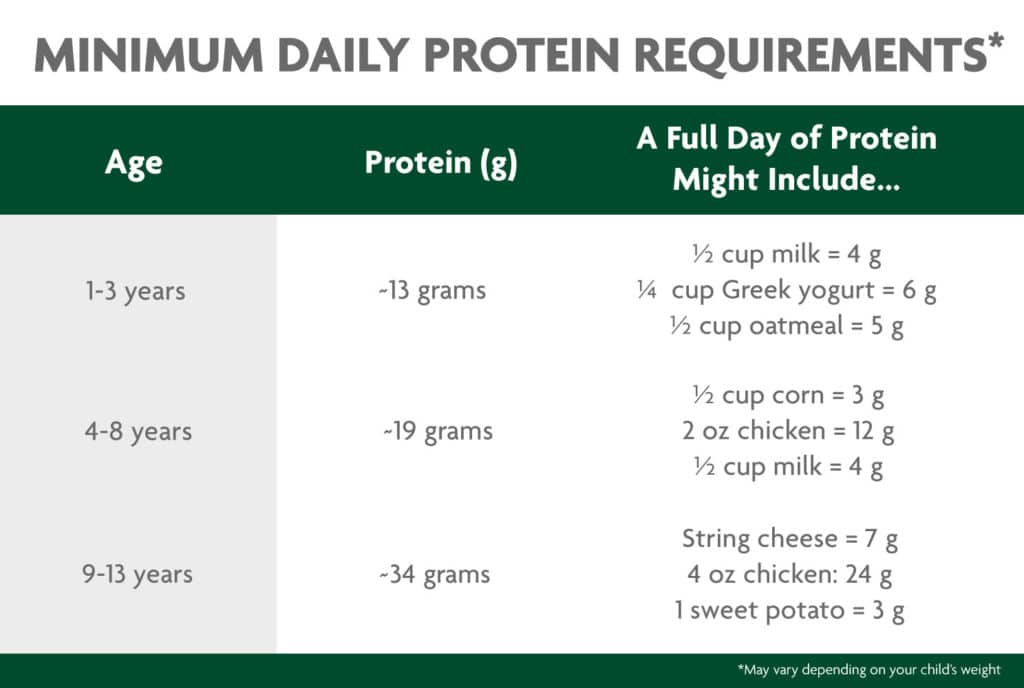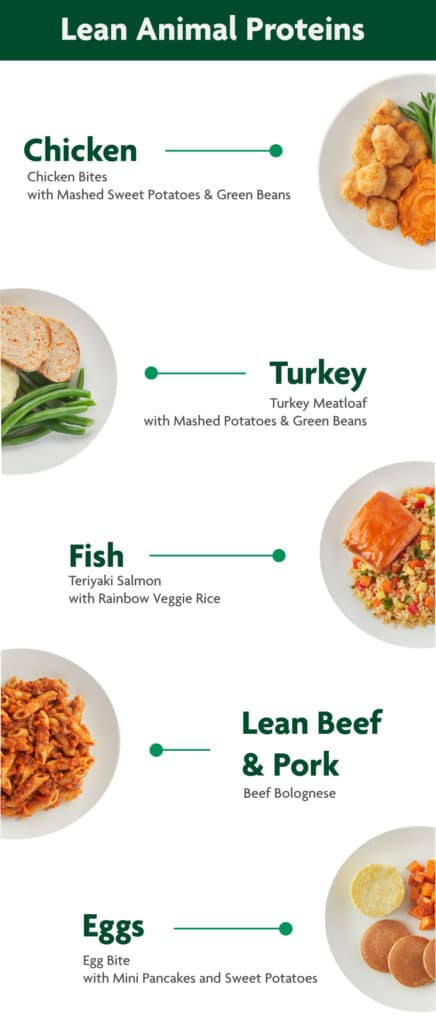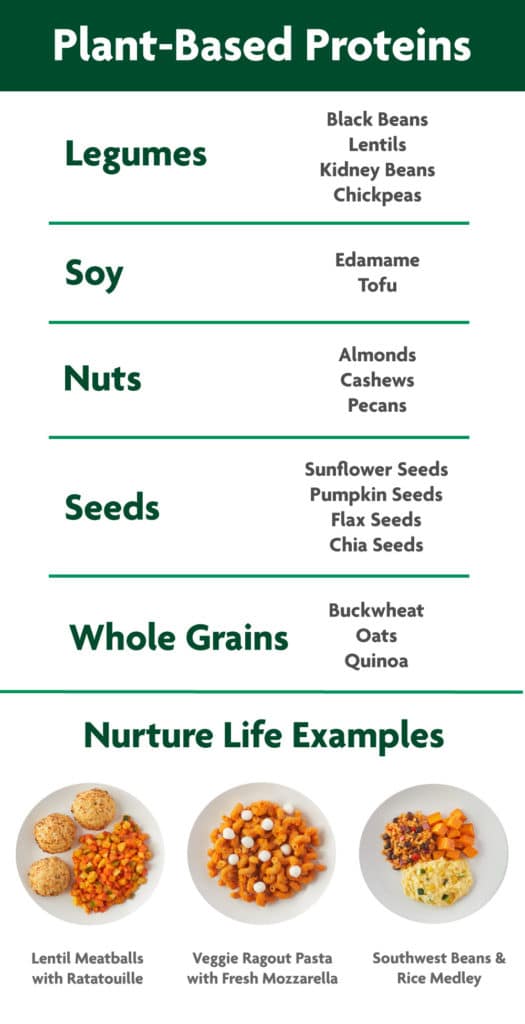Top 6 Parent FAQs on Protein for Kids
Powders, snack bars, cereals, ice cream and even gummy bears: It’s nearly impossible to walk down a grocery store aisle without coming across some new high-protein “must-have.” If you’re like many parents, you may be wondering how much is gimmick and how much is science—especially when it comes to our kids, who certainly do need a healthy amount of protein for proper growth and development.
But what exactly is a healthy amount of protein for kids? And which sources are best? Below, Nurture Life’s pediatric registered dietitian answers parents’ most common questions about this often-confused macronutrient. (And don’t worry, you can leave those protein gummy bears behind!)
1. Why Is Protein Important for Kids?
Protein is critical to the human body at every age, but it’s especially important for infants and kids who are still growing and developing at a rapid pace. Protein is often considered the fundamental building block of muscles and tissues, which it helps to build, maintain and repair. Protein also serves as an important energy source or “macronutrient” (a category that also includes carbohydrates and fats).
In the body, protein breaks down into smaller, usable forms or amino acids, which in turn function as enzymes, hormones and nutrient transporters to keep essential bodily functions running properly. Beyond our physical needs, protein also plays a role in satiation, making us feel satisfied after a meal and cueing us to stop eating when we’re full.
2. How Much Protein Should Kids Be Eating?
Kids require approximately 1–1.5 grams of protein for every 2 pounds of body weight, or more precisely, 1 gram of protein for every 1 kilogram. A child who weighs 40 pounds (or 18.2 kilograms) needs approximately 18 grams of protein per day.
But what do grams mean in terms of real food? The table below highlights some examples of what the minimum daily protein requirements for children might look like at different ages.
With Nurture Life’s healthy premade meals, you can always ensure your kids are getting at least ⅓ of their daily protein requirements. Nurture Life meals contain a minimum of 6 grams of protein in each Toddler Meal, a minimum of 8 grams of protein in each Kid Meal, and a minimum of 10 grams of protein in each Teen & Adult Meal.
3. Can Kids Eat Too Much Protein?
While it is possible for kids to eat too much protein (Most health professionals agree that moderate protein intake is best and the average individual shouldn’t consume more than 2 g protein/kg of body weight.), parents shouldn’t worry too much about this! The best thing to remember is to simply offer one serving of animal- or plant-based protein per meal and snack. Unless directed by a medical professional, you should not be adding protein supplements to your child’s meals/beverages or serving weight lifting/high-protein bars. Excessive protein intake from these types of protein isolates can be harmful to your child’s kidneys and overall health. Keep it simple by offering a balance of food groups during meal and snack time.
4. What Are the Best Sources of Protein for Kids?
There are so many great protein sources out there, and a good rule of thumb is to vary the type of protein you’re serving—not only to provide a mix of vitamins and minerals but to help your child become more familiar with new flavors, colors and textures of foods. A week of healthy meals for kids can include a wide variety of protein sources. The chart below highlights some of our favorite lean animal proteins for kids along with Nurture Life meals that offer these proteins:

Plant-Based Proteins
There are also plenty of options for your kids beyond meat-based protein! Plant-based meals can provide a lean source of protein with boosts of healthy fats and dietary fiber. Here are a few plant-based options (and easy plant-based Nurture Life meals!) you can incorporate into your kids’ mealtime:

Although it might seem different than your kid’s typical meat-based protein sources, plant-based protein can be incorporated into tons of kid-friendly meals! Nurture Life’s Lentil Meatballs feature whole grain brown rice and lentils for a healthy source of protein in a familiar meatball shape. In addition, our Veggie Ragout Pasta is a picky eater favorite and provides a surprising punch of protein from lentils blended right into the sauce.
5. Are There Any Proteins to Avoid?
In general, it’s best not to completely restrict an entire type of food, because strict boundaries tend to increase the appeal—making our kids long for the forbidden fruit (or, in this case, the fast food chicken tenders or overly processed meat products). To help encourage a positive relationship with food, it’s best to show our kids that all foods can be enjoyed and shared in moderation.
That being said, there are a few sources of protein that are far less nutritious than others! As much as possible, child nutrition experts recommend limiting the following sources of protein for kids.
Deep-Fried Foods
While the content of deep-fried dishes may be rich in protein—like chicken-fried steak or Japanese deep-fried agedashi tofu—the cooking method definitely increases the amount of unhealthy fats. In some restaurants, deep-fried foods contain high levels of trans fat as well. You can learn more about healthy alternatives to common unhealthy fats by checking out our FAQ on fats for kids.
Protein Powders
Protein powders are categorized as a “dietary supplement” by the FDA, which means that they are not regulated and that the manufacturers themselves are responsible for quality and safety. Unfortunately, one Harvard study, updated in 2020, independently tested 130 protein powders and found that many products contain:
- Heavy metals like lead, arsenic and mercury
- Bisphenol-A (BPA)
- Pesticides
- Contaminants with links to cancer
Note to reader: We understand parental concerns about heavy metals in kids’ food. Rest assured, our products are free from lead, arsenic, mercury, and other heavy metals. We use only the highest quality ingredients, and we’re constantly re-evaluating our farmers and purveyors to source the very best products for your family. Choose Nurture Life with confidence, knowing your children are getting the safest and most nutritious food possible.
Processed/Cured Meat Products
Processed meats like hot dogs, bacon and some types of sausage tend to be high in saturated fats. Additionally, cured meats often contain nitrates or nitrites as preservatives, which may be linked with negative health outcomes and are never-evers in Nurture Life’s nutritional standards.
6. Is Plant-Based Protein Healthier for Kids?
Both plant- and animal-based proteins can offer a balanced diet for kids, as these two protein sources provide different nutritional benefits:
- Animal-based proteins are a complete source of amino acids, and full of important vitamins such as B12, and niacin and also minerals including iron and zinc.
- Plant-based proteins are usually lower in fat, free from cholesterol and high in key nutrients like folate, potassium, iron and magnesium. Plant-based proteins typically contain soluble and insoluble fiber, too, which helps keep our digestion regular and contributes to feelings of fullness after eating.
Nurture Life offers a variety of proteins for kids, so it’s easy to match our healthy kids meals to your child’s dietary preferences. Our vegetarian meals include Southwest Beans & Rice Medley (8 g protein in the Kid size) and Mac & Cheese with Cauliflower (17 g protein in the Kid size). All of our meat-based meals—like our Turkey Meatloaf (15 g protein in the Kid size)—also come with hearty servings of vegetables and whole grains to provide essential vitamins, minerals and fiber.
If you find it challenging to keep a diverse stock of proteins on hand, order a few of Nurture Life’s healthy kids meals to store in the fridge or to freeze and save for later! You can easily round out your family’s favorite proteins with well-balanced, freshly made meals developed by a team of registered dietitians.
If you have any questions about your child’s daily protein requirements or our healthy meals for kids and adults, please reach out anytime! Just send your message to support@nurturelife.com.

